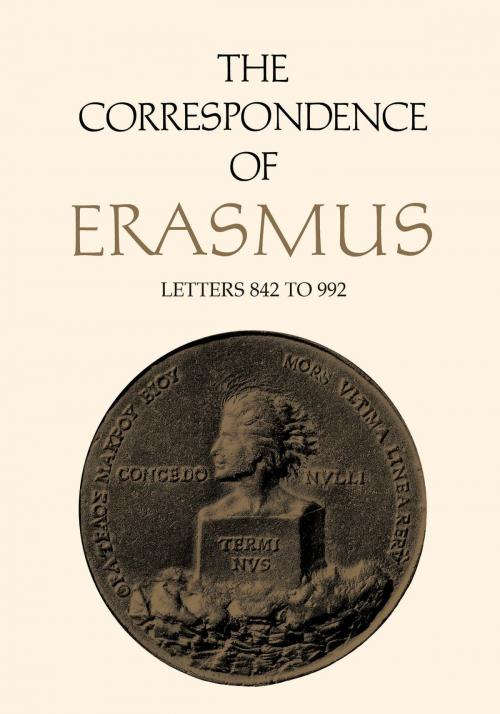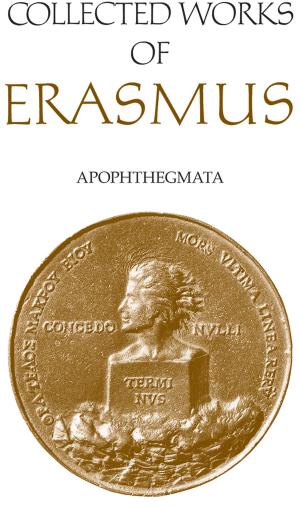The Correspondence of Erasmus
Letters 842-992 (1518-1519)
Nonfiction, Religion & Spirituality, Philosophy, History, Criticism, & Surveys, Renaissance, Fiction & Literature, Essays & Letters| Author: | Desiderius Erasmus, P.G. Bietenholz | ISBN: | 9781487512392 |
| Publisher: | University of Toronto Press, Scholarly Publishing Division | Publication: | December 15, 1982 |
| Imprint: | Language: | English |
| Author: | Desiderius Erasmus, P.G. Bietenholz |
| ISBN: | 9781487512392 |
| Publisher: | University of Toronto Press, Scholarly Publishing Division |
| Publication: | December 15, 1982 |
| Imprint: | |
| Language: | English |
This volume covers a number of significant events and issues in Erasmus' life and in the history of his times. He travels on horseback from Louvain to Basel to assist his publisher and friend Johann Froben during the crucial phases in the production of his revised New Testament, the edition that he feels will be his lasting contribution to the scholarly foundations of the Christian faith. Once it is in the hands of the public he feels he will be able to face the approach of old age more calmly. On the return journey to Louvain he falls gravely ill from what is diagnosed as bubonic plague, but recovers in a month and convalesces in the home of another publisher-friend, Dirk Martens.
International politics continue to capture his attention. Requests for funds in support of a papal crusade against the Turks arouse the flames of German national sentiment. With the death of Maximilian I, friends of Erasmus such as Richard Pace, Ulrich von Hutten, and Guillaume Budé are involved in diplomatic negotiations concerning the imperial succession. When Prince Ferdinand arrives from Spain and requires a tutor, the question of Erasmus' own return to active court duties is raised.
After the appearance of Luther's Ninety-five Theses on indulgences, purgatory, and papal authority, the question arises among conservatives whether Erasmus' work too is a threat to the traditional ways of the church and society. For the time being, Erasmus is prepared to commend Luther and defend the latter's right to be critical of the church. Erasmus' overriding conviction at this point is that he and Luther are both part of the great intellectual and spiritual renewal that is taking place in so many parts of Europe. As Luther's appearance lends a new kind of spiritual and patriotic vigour to German humanism, the cult of Erasmus–Erasmus the fellow German–becomes an integral part of that new enthusiasm, with Saxony and its elector, Frederick the Wise, at its center.
Volume 6 of the Collected Works of Erasmus series.
This volume covers a number of significant events and issues in Erasmus' life and in the history of his times. He travels on horseback from Louvain to Basel to assist his publisher and friend Johann Froben during the crucial phases in the production of his revised New Testament, the edition that he feels will be his lasting contribution to the scholarly foundations of the Christian faith. Once it is in the hands of the public he feels he will be able to face the approach of old age more calmly. On the return journey to Louvain he falls gravely ill from what is diagnosed as bubonic plague, but recovers in a month and convalesces in the home of another publisher-friend, Dirk Martens.
International politics continue to capture his attention. Requests for funds in support of a papal crusade against the Turks arouse the flames of German national sentiment. With the death of Maximilian I, friends of Erasmus such as Richard Pace, Ulrich von Hutten, and Guillaume Budé are involved in diplomatic negotiations concerning the imperial succession. When Prince Ferdinand arrives from Spain and requires a tutor, the question of Erasmus' own return to active court duties is raised.
After the appearance of Luther's Ninety-five Theses on indulgences, purgatory, and papal authority, the question arises among conservatives whether Erasmus' work too is a threat to the traditional ways of the church and society. For the time being, Erasmus is prepared to commend Luther and defend the latter's right to be critical of the church. Erasmus' overriding conviction at this point is that he and Luther are both part of the great intellectual and spiritual renewal that is taking place in so many parts of Europe. As Luther's appearance lends a new kind of spiritual and patriotic vigour to German humanism, the cult of Erasmus–Erasmus the fellow German–becomes an integral part of that new enthusiasm, with Saxony and its elector, Frederick the Wise, at its center.
Volume 6 of the Collected Works of Erasmus series.















